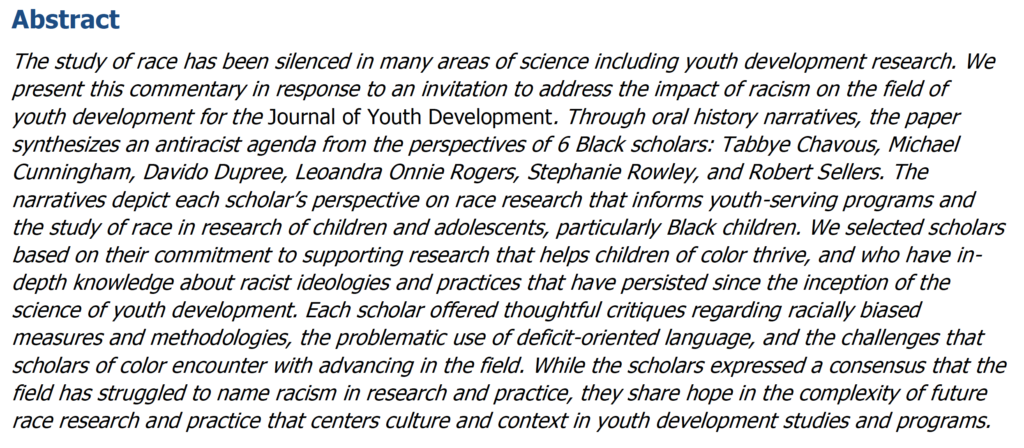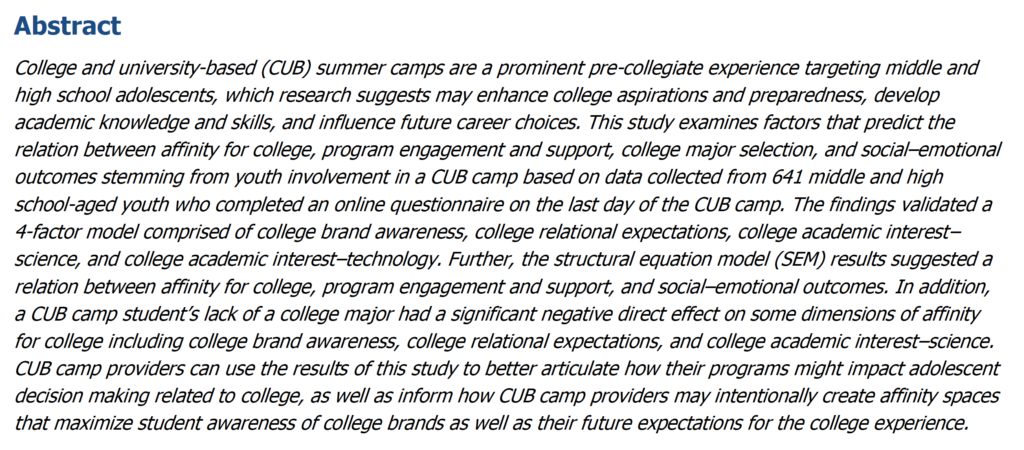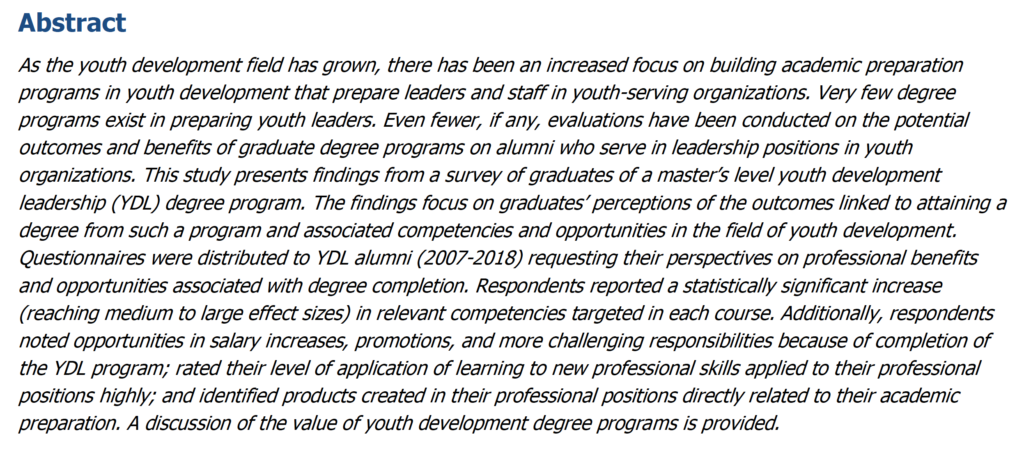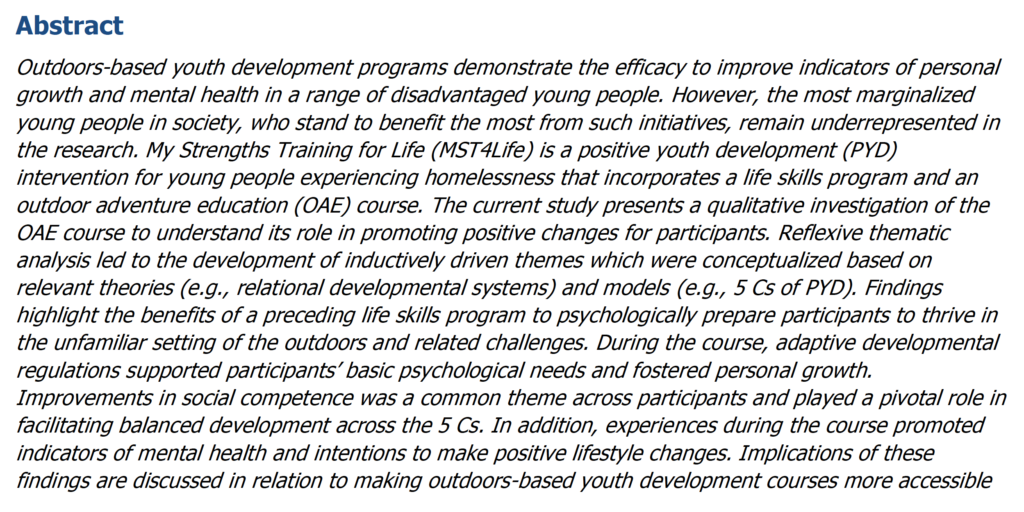Our Youth Development Leadership (YDL) team strive to contribute novel and significant research to the field of youth development. In the current issue of the Journal of Youth Development (JYD), our YDL team were lead and co-authors on four of the 15 articles published. In this blog post, you can find the titles and abstracts of each of these articles and read a statement from the authors to hear what excited them about their research.
Article 1 – Silence is Not an Option: Oral History of Race in Youth Development Through the Words of Esteemed Black Scholars, Dr Corliss Outley and Dr Keshia L. Harris,
Dr. Corliss Outley, “The attention to social justice and anti-Black racism after the death of George Floyd provided a pivotal moment to refocus our attention on the master narratives surrounding Black scholars and the research on Black youth and their programmatic needs. I was excited because so many of the themes covered in the article were often discussed in the hallways and in classrooms but were rarely presented in journal articles. As Black scholars we often wondered, “Why are these issues being ignored? How do we get the field to see the harm it is causing?”. This piece attempts to answer some of those questions and gives voice to the lived experiences of many Black scholars in the field of youth development as they have navigated their career, challenged theoretical and methodological misconceptions on race, and look with hope toward the future in the field. I hope this research takes each reader on a journey of introspection and reflection on their role in the field and ask their assistance in dismantling antiblack tendencies that dehumanize Black youth in research and silence the academic experiences of Black scholars”

Follow this link for the full text – https://bit.ly/outleyarticle.
Article 2 – Cultivating Youth Affinity for College Within the Context of Campus-Based Summer Camps, Dr Barry Garst et al.
Dr. Barry Garst, “College and university experiences are life changing. Understanding how early exposure to college and university experiences such as CUB camps may help adolescents develop an affective attachment to the college or university hosting the CUB camp is important for the youth development field and for those working in higher education. Creating impactful, high-quality CUB camp experience that build an affinity for college in adolescents creates a win-win situation for everyone involved in the process.”

Follow this link for the full text – https://bit.ly/garstarticle.
Article 3 – Acquisition of Knowledge and Skills in an Online Graduate Degree in Youth Development Leadership, Dr William Quinn, Dr Edmond Bowers, Dr. Parisa Hadiandehkordi, & Dr Garst
Dr. Quinn, “In this study of our M.S. Youth Development Leadership degree program, 71 graduates provided importantinformation regarding the benefits of the degree in their professional advancement. The top three benefits reported by graduates were: (1) salary increases in their current positions; (2) one or more promotions with more challenging leadership responsibilities; and (3) new opportunities in other youth development organizations. Furthermore, graduates reported deliverables they had produced since their degree with the top three being: (1) writing funded grant proposals, (2) conducting youth program assessment; and (3) writing new curricula that better exemplified the needs and interests of youth. This study suggests that a graduate degree program in Youth Development Leadership adds substantial human capital to the field of youth development and youth development organizations to serve youth effectively”

Follow this link for the full text – https://bit.ly/quinnarticle.
Article 4 – Promoting Personal Growth in Young People Experiencing Homelessness Through an Outdoors-Based Program, Dr Parry et al.
Dr. Parry, “What really excited me about this research was the novelty of the research topic. To the best of my knowledge, there is no research that explores the impact of outdoor courses to improve psychosocial outcomes in young people experiencing homelessness. This qualitative study provides rich insights into participants’ experiences of the 4-day residential outdoor course which implemented outdoor adventure education and strengths-based practices. Our study suggests participants experienced personal growth, improvements in indicators of positive youth development, and changes in attitudes and believes that have the potential to sustain long-term benefits. In sum, outdoor courses show the potential to be a catalyst for change in disadvantaged young people – a phenomenon that warrants further exploration.”

Follow this link for the full text – https://bit.ly/parryarticle.
Finally…
We hope this blog post is an informative resource for you and provides insight into the high-quality research our YDL team contributes to the field of youth development.
If this blog post has inspired you, Clemson University offers an online Master of Science degree in youth development leadership (36 credit hours, 12 courses, 2 years) as well as a Graduate Certificate in youth development leadership (15 credit hours, 5 courses). These programs are designed and delivered by our YDL team and provide resources and knowledge for professionals working in youth development settings. For more information, visit https://www.clemson.edu/cbshs/departments/prtm/degrees/graduate-degrees/youth-development-leadership.html or email youthdev@clemson.edu.
